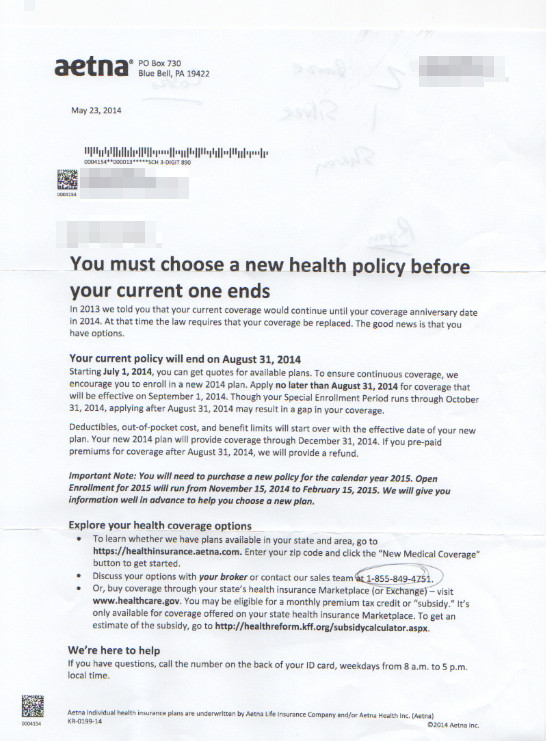As part of The Affordable Care Act, many Americans have had to change insurance providers or plans. I’m old enough to realize that wide-sweeping changes like this legislation will surely face many legal, technological and financial obstacles; I've even talked about some of these issues before. Suffice to say, I didn’t expect a new policy that affects every American would be carried out without significant challenges. I just never anticipated basic communication would be one of them.
Let me explain.
In mid-June, I received the following letter from Aetna, my current health and dental insurance provider:
Note the circled number above that I needed to call to discuss my options.
On July 2nd, I dutifully called that number only to be told that I needed to call Costco.
Yes, Costco. That Costco.
I explained to the Aetna rep that I wasn't looking to buy a 12-pack of ibuprofen. I wanted to purchase coverage for myself. The word Costco didn't appear on this letter. Why on earth would I go there?
The Aetna rep explained to me that Aetna sent out blanket letters that "may or may not" apply to individual customers.
I was in disbelief. "May or may not?" What is that? Aetna knows my entire medical history, home address, social security number, and other things that few individuals and companies (at least, I hope) know. How can a company not run a basic database query and mail merge to send me a relevant letter? Being able to segment customers based on "STATE=NV" isn't exactly rocket surgery.
There was no sense in arguing with the poor Aetna rep who happened to answer my call. Eventually, I talked to a separate Costco rep about my medical options. At present, I am reviewing them against other plans and carriers.
Why was I upset? It's fine if Aetna's top brass decides not to offer people like me coverage. It's the company's right as a business to serve or not serve Nevadans. I'm less forgiving, though, about the way in which the company communicated its decision. It was both wholly inefficient and, from a data-management perspective, just plain lazy.
Simon says
Forget sexy technologies like natural language processing that help make sense out of unstructured data. As the example above illustrates, far too many companies suffer from an inability and/or unwillingness to use what I call Small Data.
Is yours one of them?
Feedback
What say you?

